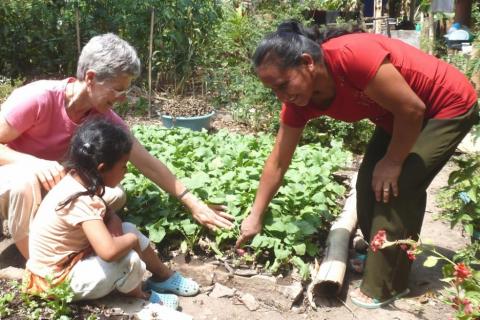
What are the gifts and talents that each of us is given to administer to the best of our abilities?
I propose that one gift is that piece of the planet we each inhabit or have under our influence. Some people are given vast expanses; others, only a tiny room; but we all have some effect on a bigger part of the environment in the way in which we consume, travel, amuse ourselves and dispose of our waste. The stewardship each of us applies in how we choose to live will affect our final judgment.
Those who care well for their piece of the treasure will be prosperous and it will produce abundant fruits, enough to give to the poor, and they will not be surprised by the Lord’s coming. It is said that St. Francis, while working in his garden, was asked what he would do if he knew that day would be his last, and replied, “I would finish hoeing my garden.”
The message of global climate change has been widely proclaimed and the pope’s encyclical, “Laudato Si": On the Care for our Common Home” emphasizes our need for dialogue, conversion, and action. In my work as a Maryknoll Lay Missioner in El Salvador we study and discuss the encyclical in the rural parish where I live and we implement what we can through our agricultural and environmental ministries. The people can relate very well to the need to control pollution and many are very aware of the bad habits of just tossing trash anywhere and everywhere, of using disposable cups and plates, leaving Styrofoam cups and plates strewn all over, and placing everything to be sold inside a black plastic bag, whether needed or not, resulting in those bags blowing all across the littered landscape. But at least some people are starting to change these habits.
Farmers who eke out their existence trying to produce enough corn and beans to feed their families from the rough terrain of the small plots they do not own are not concerned about reducing their carbon footprint by driving cars that get better mileage or by using low-water-requiring landscaping or even recycling. They do wish the buses in which they travel spewed less black smoke. They do try to keep a few plants, often vegetables, alive in their yards during the dry season to help keep the dust down, sometimes using the water already used to wash clothes or dishes. And they sell any unusable item to the junk collectors who travel the countryside.
The main effects of climate change here are the abnormally extreme wet and dry seasons and catastrophic storms that result from altered weather patterns. Insufficient or excessive rainfall leads directly to hunger among the poor, not only those who live in the rural areas whose harvests are reduced, but also the urban poor who, with the meager wages they earn, have to pay more for scarce food. With more frequent and powerful storms, torrential rains wash away hillside farms, fields, homes and roads, and cause flooding and destruction. We try to encourage reforestation, agroforestry practices that preserve trees among crops to make soils less susceptible to erosion, contour planting and other soil conservation techniques, though many are difficult to implement on land that is owned by others.
When Salvadorans plant their crops on the contour of the hillside, wash reusable dishes after serving refreshments, refuse extra plastic bags for their market purchases, and put their trash in wastebaskets instead of tossing it in the road, their small actions are contributing to caring for our common home. When people who drive cars select models that consume less fuel and emit fewer air pollutants or even better, opt for using public transportation, or conserve water through landscaping design, or recycle as much trash as they can, they are caring for our common home. And when those who can, advocate for structural changes and laws that have a far-reaching effect on the climate and environment, then they are contributing to the care of our common home. As they have cared for the piece of Earth that is their home and treasure, they will be given more, and be blessed and prosperous; they are children of the light and of the day who will not be surprised by the Lord’s coming.
